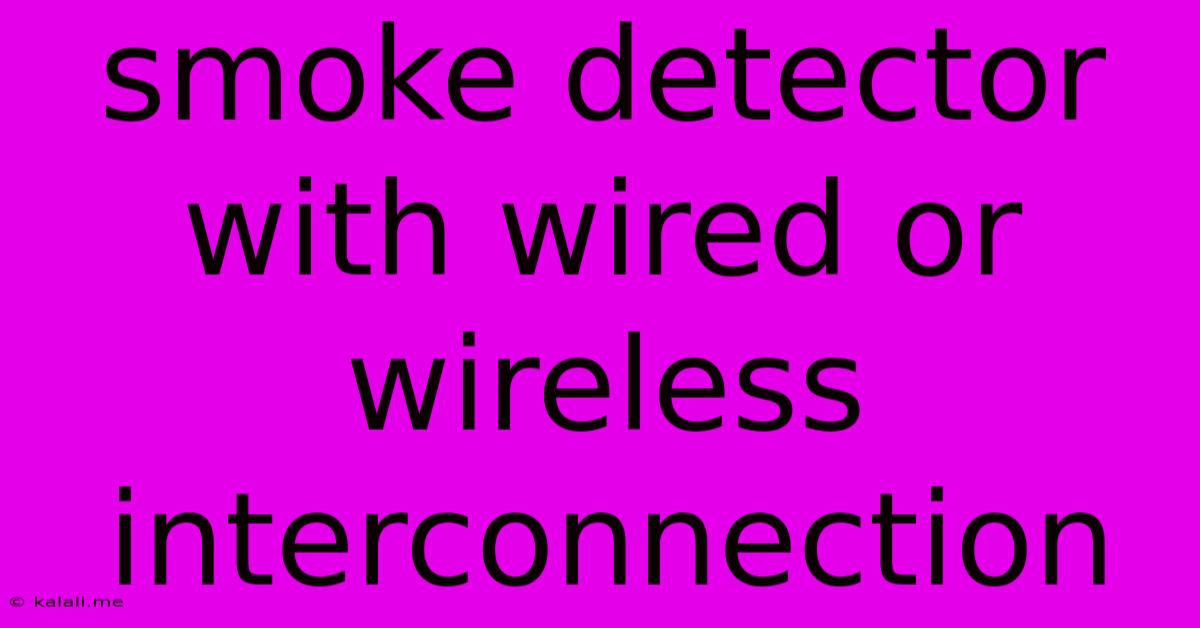Smoke Detector With Wired Or Wireless Interconnection
Kalali
May 23, 2025 · 3 min read

Table of Contents
Wired vs. Wireless Interconnected Smoke Detectors: Which is Right for Your Home?
Protecting your home and family from the devastating effects of fire is paramount, and a reliable interconnected smoke alarm system is a crucial part of that protection. But with the choice between wired and wireless interconnected smoke detectors, deciding which system is best for your needs can be confusing. This article will delve into the pros and cons of each, helping you make an informed decision for your home safety.
Choosing the right system hinges on several factors, including your home's structure, your budget, and your level of DIY comfort. Let's break down the key differences and considerations.
Wired Interconnected Smoke Detectors: A Tried and True Approach
Wired interconnected smoke detectors offer a robust and reliable solution. These detectors are hardwired into your home's electrical system, providing a permanent and tamper-resistant connection. When one detector senses smoke, the signal travels through the wiring to all other connected detectors, triggering an alarm throughout the house simultaneously.
Pros:
- Reliability: Wired systems are known for their consistent performance and minimal risk of signal interference.
- Power Source: Permanently connected to the power supply, eliminating the need for battery changes. While often including a backup battery for power outages, the primary power source ensures consistent operation.
- Tamper-Resistant: Hardwired connections make them more difficult to disable accidentally or intentionally.
- Consistent Signal: The wired connection ensures a strong and reliable signal transmission between detectors.
Cons:
- Installation Complexity: Requires electrical expertise for installation, potentially increasing labor costs.
- Wiring Challenges: Retrofitting existing homes can be challenging, potentially requiring extensive rewiring, which can lead to higher costs.
- Less Flexibility: Relocating detectors later requires rewiring, unlike wireless systems.
Wireless Interconnected Smoke Detectors: Convenience and Flexibility
Wireless interconnected smoke detectors communicate with each other using radio frequencies. They are typically battery-powered, offering greater flexibility in placement and installation. Just like wired systems, when one detects smoke, all connected detectors sound the alarm.
Pros:
- Easy Installation: Simple to install without specialized electrical knowledge, making them a DIY-friendly option.
- Flexibility & Portability: Can be easily moved or relocated as needed. Ideal for renters or those frequently moving.
- Cost-Effective: Typically less expensive upfront than wired systems, excluding the initial investment in the necessary mesh networking.
- Wider Range of Features: Some wireless models offer additional features such as voice alerts, carbon monoxide detection, and smartphone integration.
Cons:
- Battery Reliance: Requires regular battery changes, although some newer models boast longer battery life. A dead battery renders the detector useless.
- Signal Interference: Wireless signals can be susceptible to interference from other electronic devices or physical obstructions, potentially affecting reliability.
- Potential for Signal Dropouts: Thick walls or other obstructions can weaken the signal, hindering communication between detectors.
- Security Concerns: While sophisticated encryption techniques are employed, there's a slightly higher potential for signal jamming, though this is unlikely in a home setting.
Making the Right Choice: Factors to Consider
The best choice depends on your specific circumstances:
- Budget: Wireless systems are generally cheaper upfront, while wired systems may save money on long-term battery costs.
- Home Structure: Wiring complexity in older homes often makes wireless systems a more practical option.
- DIY Skills: Wireless systems are ideal for DIY enthusiasts, while wired systems require professional installation.
- Reliability Requirements: Wired systems generally offer superior reliability, while wireless systems offer flexibility.
Ultimately, both wired and wireless interconnected smoke detectors provide crucial home safety. By carefully weighing the pros and cons of each and considering the factors above, you can choose the system that best meets your needs and budget, ensuring your family's safety and peace of mind.
Latest Posts
Latest Posts
-
How To Clean A Jetted Tub
May 23, 2025
-
Does Fish Sauce Need To Be Refrigerated
May 23, 2025
-
I M Trying To Get My Friends Out Of Facebook
May 23, 2025
-
Lyrics To I Am The Highway By Audioslave
May 23, 2025
-
How To Get A Bird Out Of Your House
May 23, 2025
Related Post
Thank you for visiting our website which covers about Smoke Detector With Wired Or Wireless Interconnection . We hope the information provided has been useful to you. Feel free to contact us if you have any questions or need further assistance. See you next time and don't miss to bookmark.